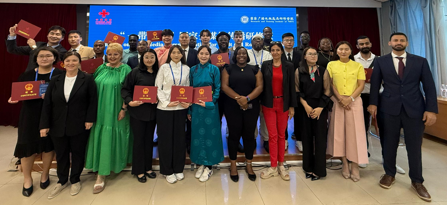A renowned Chinese professor at the African Communication Research Centre has appealed to developing countries to debunk Western propaganda and negative campaigns against China and its people’s culture.
Prof. Zhang Yanqiu, Deputy Dean of the Institute for a Community with a Shared Future, who also doubles as the Director of the Africa Communication Research Centre at the Communication University of China, said there are a lot of negative narratives about China from all over the world, which is not good for developing countries.
“A lot of you know negative narratives about China all over the world, and it is not good for developing countries. If developing countries do not really understand China well, how can we collaborate? How can you draw a lot of investment to China?” she asked.
She said China invites African and international media practitioners to receive training or attend seminars in China to let them see the country.
“We say seeing is believing, and then when they go back home, they can choose the news with their mind instead of following the international agencies blindly,” she said.
Professor Zhang Yanqiu made the comments during a two-week seminar for media professionals from the Belt and Road Initiative of the People’s Republic of China on full media communication for Belt and Road countries in Beijing that brought together 32 media professionals from 10 countries, including South Sudan.
For her part, Akisha Nikisha Felix, the Chief Executive Officer of Pineapple Marketing in the Island of Grenada, said her visit to China has debunked whatever perception she had about the Chinese people and their culture.
“They say the Chinese do not share culture, and that is again fabrication because we have been here for the last two weeks and have been to almost all the Chinese activities, we feel welcomed, we feel at home,” she told Radio Tamazuj during an interview in Beijing, the capital of China. “We are more fixed on Western news or Western media, so the perception that they have built about China is totally different, and I can attest to that simply because they are of the notion that you walk into China and eat dogs, cats’ meat, and whatever, but that is not true.”
Meanwhile, Fredrick Osifelo, Manager of Television Services of the Solomon Islands Telekom Company Limited, said the seminar has equipped him with a renewed sense of appreciation for the Chinese people and their country.
He shared his experience of his stay in China, visiting Chinese tourist sites, including the Great Wall of China.
“Being part of this training, the discussion and the visits have allowed us to visit other parts of China, for which some of these places I have only seen in books, magazines, and documentaries. I finally came and saw for myself and experienced what it feels like to be here,” Osifelo said. “Our trip to the Great Wall of China was quite an emotional experience for me. In my family, I will be the second person to have ever visited the Great Wall of China, the first being my father. Just being there was real, it had a sense of kind of warmth, and the feeling around that place, you feel like you were stepping into ancient times.”
Dagiimaa Bat-Erdene, a Translator and Journalist of the Mongolian National News Agency, described the seminar as a success, lauding the Chinese reception and skills gained from the professors during the seminar.
“It is the first time I have been here in China. I liked the training; the Chinese professors have been very skilful,” she said. “I learnt a lot of things about the Chinese media system and the Chinese culture, and visiting Yunnan was very interesting for me because it has more than 20 ethnic groups.”




